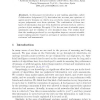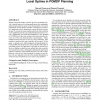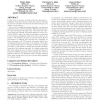PRIMA
2015
Springer
8 years 7 months ago
2015
Springer
Abstract. Leximin AMODCOP has been proposed as a class of Multiple Objective Distributed Constraint Optimization Problems, where multiple objectives for individual agents are optim...
PRIMA
2015
Springer
8 years 7 months ago
2015
Springer
In this paper we introduce a new ranking algorithm, called Collaborative Judgement (CJ), that takes into account peer opinions of agents and/or humans on objects (e.g. products, ex...
PRIMA
2015
Springer
8 years 7 months ago
2015
Springer
In [13] the authors developed a logical system based on the definition of a new non-classical connective ⊗ originally capturing the notion of reparative obligation. The operator...
ATAL
2015
Springer
8 years 7 months ago
2015
Springer
ATAL
2015
Springer
8 years 7 months ago
2015
Springer
Transfer learning has proven to be a wildly successful approach for speeding up reinforcement learning. Techniques often use low-level information obtained in the source task to a...
ATAL
2015
Springer
8 years 7 months ago
2015
Springer
Consider a good (such as a hotel room) which, if not sold on time, is worth nothing to the seller. For a customer who is considering a choice of such goods, their prices may chang...
ATAL
2015
Springer
8 years 7 months ago
2015
Springer
Partially observable Markov decision processes (POMDPs) provide a natural framework to design applications that continuously make decisions based on noisy sensor measurements. The...
ATAL
2015
Springer
8 years 7 months ago
2015
Springer
In this work we propose a decision-theoretic approach to Intelligent Tutoring Systems (ITSs) that seeks to alleviate the need for extensive development and hand-tuning in the desi...
ATAL
2015
Springer
8 years 7 months ago
2015
Springer
The streams of tweets from and to the Twitter account of urban transport operators have been considered. A computational module has been designed and developed in order to collect ...
ATAL
2015
Springer
8 years 7 months ago
2015
Springer
The computer-based simulation of military tactics has largely involved the use of platform-dependent scripting resulting in behaviour that is limited, and difficult to debug and r...






